The newsletter of the SDC Agriculture & Food Systems Network provides you with the latest news submitted by the network members four times a year: projects, publications, events, network activities - everything to do with food systems. Feel free to subscribe by clicking the button on the right (network members are automatically subscribed).
Latest issue: March 2024

Members' Articles |
News |
Events |
Who is who |
Comic |
Archive
Editorial
After a very busy 2023, the A&FS Network focal team is in the process of turning its hand to new things. But we are continuing to run some of our activities, such as
Thoughts for Food and our newsletters. Also, on 21st March we launched a
new learning series on the Rio Conventions with our colleagues over at the CDE network.
Meanwhile, our network members and their organisations have been extremely active too, and have submitted an impressive array of reports on their innovative engagement across the world.
Oliver Genard, reporting in French from Burkina Faso describes the success of an agroecological project using zaï, which is the process of digging small pits to retain water and concentrate compost, noting that in agroecology there is no such thing as a "copy-paste approach”, while in neighbouring Togo, also on the subject of agroecological transformation, Nicole Bolliger explains how the Mouvement Alliance Paysannes de Togo are working to professionalise agricultural labourers, not least through training on sustainable land-use practices.
Readers interested in the application of rural development services for agroecological transition will be drawn to a new tool developed by GFRAS which has been tested in Latin America and Madagascar, as illustrated by Ingrid Oliveira who is also welcoming network members to get involved. Meanwhile, just across the Strait of Mozambique, Morgan Gomo and William Grant portray how the MSD-related project PROMAS is using loan-saving mechanisms to unlock virtuous market cycles for seed purchases, and along the way facilitate farmers’ access many other services. Also, in the thematic area of Market System Development, Julien Brewster and Francesco Melara describe the FOSTER project in Myanmar which is driven by passionate local communities and seeks to serve thousands of crisis-affected households and displaced people in southern Shan state. In yet more from private-sector engagement, Ema Jakimovska and Gabriela Micevska reporting from North Macedonia explain how innovative contract farming can be a win-win situation for cultivators and traders in a mutual relationship that contributes to the sustainability of the country’s food sector.
Anyone who is curious about the concept of a City Food Desk is well-advised to read the article by Helen Prytherch and others on NICE’s (Nutrition In City Ecosystems) innovative work in Bangladesh and other countries which aims to do no less than transform urban food systems; and Myrtel Valenzuela of Columbia University reports how the People-Centred Food Systems Project is applying a human-rights approach to establishing the rules of food systems transformation in Cambodia, Honduras, Ethiopia and Uganda.
Working on the Nexus, James Mulkerrins of ISSD Africa writes about the challenges to maintain functional seed systems in fragile and conflict-affected contexts and how seed-interventions need to be considered as a core-component of humanitarian and development responses, but how careful coordination and foresight can make the difference between real help and long-term damage. Finally, in a contribution on livestock, Genevieve Owuor of Vétérinaires Sans Frontières Suisse explains how in Kenya caring for the welfare of camels can prevent human suffering.
Last but not least, I would like you to meet Héloïse Bellenot who joined our team in February and has just taken over the management of our newsletter until next year. Find out more about Héloïse under our who’s who!
 Bruce Campbell
Bruce Campbell
A&FS Network Focal Point
bruce.campbell@eda.admin.ch
Members' Articles: Focus Markets
How to strengthen food system resilience in a fragile context? Learnings from Myanmar
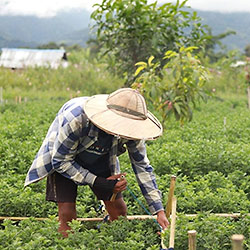 The FOSTER project, implemented by HEKS/EPER in Myanmar, aims to strengthen food security and improve the incomes of smallholder producers by applying a market systems development (MSD) approach. In the highly fragile context stemming from the conflict, working with social businesses and the private sector proves highly adequate. Key lessons learned from the first two years of implementation include the need for flexibility and agile and adaptive programming, frequent and rapid market assessments, and a joint understanding with the donor.
The FOSTER project, implemented by HEKS/EPER in Myanmar, aims to strengthen food security and improve the incomes of smallholder producers by applying a market systems development (MSD) approach. In the highly fragile context stemming from the conflict, working with social businesses and the private sector proves highly adequate. Key lessons learned from the first two years of implementation include the need for flexibility and agile and adaptive programming, frequent and rapid market assessments, and a joint understanding with the donor.
 Julien Brewster
Julien Brewster
HEKS/EPER
LinkedIn |
julien.brewster@heks-eper.org
 Francesco Melara
Francesco Melara
HEKS/EPER
LinkedIn
Read the full article
The FOSTER Project
The Fostering Food Security, Food Systems and Inclusive Business (FOSTER) project aims to improve food security, income and social inclusion for more than 26'000 marginalized and crisis-affected households in Myanmar. Initiated by HEKS/EPER in 2021, the project received co-financing support in 2022 from the Swiss Agency for Development and Cooperation (SDC) for an additional four years. The project operates primarily in the Southern Shan state and peri-urban areas of Yangon. The context is characterized by political and economic instability, protracted conflict and displacement, and a worsening humanitarian crisis.
Working in an increasingly fragile context
A fragile context can be defined as an area characterized by significant instability and vulnerability, typically caused by conflict or natural disasters. Weak governance, limited infrastructure, humanitarian crisis and social inequalities are often key features of such contexts, which can all hinder efforts to support inclusive and sustainable market development.
The 2021 military coup in Myanmar and the subsequent expansion of civil conflicts have resulted in an estimated
2.7 million people being internally displaced. The coup disrupted economic activities, and high rates of inflation have
doubled the cost of a healthy diet and the proportion of households facing food insecurity. 18.6 million people are
estimated to be in humanitarian need in 2024. Disadvantaged groups including smallholder farmers, ethnic and religious minorities, women and children and internally displaced people (IDPs) have been most affected by these impacts.
The conflict in Kayah state and the recent escalations in Southern Shan state have resulted in an estimated 100'000 IDPs now taking refuge in Southern Shan state, increasing the needs and creating additional challenges to the project implementation. For example, due to conflict project partners have been compelled to close one-stop agricultural service centres and relocate training facilities to different areas. Furthermore, security concerns and conflict have displaced communities previously supported to engage in the production of chilli and other crops. This has prevented the harvesting of crops and led to the cancellation of planned agricultural interventions. The recent announcement that Myanmar's conscription law will be enforced is also significantly affecting the security of staff and partners.
Flexible and adaptive design
Given the fragility and fluidity of the context in Myanmar, the FOSTER project has been designed with an integrated approach linking food security relief with agricultural development, skills and employment and social cohesion interventions. Social cohesion initiatives include promoting inter-ethnic interaction and collaborations around mutual interests, such as the sharing of solar water irrigation pumps. The availability of a contingency budget has also allowed the programme to efficiently address humanitarian needs in project areas.
FOSTER's design takes into account years of programming in the conflict-affected border regions of Myanmar which has found a need for more market-oriented livelihoods interventions, with a key focus on enabling self-reliance. The project's approach involves the piloting of smaller interventions which are iterated upon and scaled up or down based on their results and contextual developments. This approach more easily allows for flexibility and innovation, provided there are clear criteria in place to inform decision making on when to scale up or drop a given intervention. Using the
Adopt-Adapt-Expand-Respond Framework to identify where systemic change may be occurring, along with regularly assessing the interventions alignment with the project's overall goals, are examples of such criteria.
Engaging the private sector and social businesses
The project does not engage with the de facto military government authorities, in line with other development partners. This has limited the potential scope for systemic interventions that typically require government involvement (particularly related to influencing the rules or regulations that affect a market system). Consequently, the project primarily works with the private sector and social businesses. The project has found that the crisis has resulted in greater receptiveness amongst companies to collaborate with development partners and adapt their business models to become more inclusive, partially as a strategy to buffer the shocks of the crisis.
For instance, FOSTER engages with the agri-tech and machinery service provider
Tun- Yat. HEKS/EPER supported them to diversify their business and to leverage their networks and expertise to produce nutritious food recipes such as dehydrated porridge using local ingredients (sesame and peanut) sourced from Myanmar farmers. These recipes have been used for both humanitarian aid distribution and are also sold commercially online and across more than 260 outlets nationwide. More than 400 people from disadvantaged groups have also been trained by the company on how they can locally replicate such recipes for income generation. This has helped to promote local products, address food insecurity, and enhance skills opportunities.
Additionally, the project has discovered that in times of crisis, opportunities emerge to work with local entrepreneurs and champions willing to assist their communities. For example, inspired by seeing people in poverty struggle for food in parts of peri-urban Yangon, entrepreneur Zay Cho established an affordable meal shop offering nutritious and safe meals to underprivileged people. The project provided trainings on food safety and start-up capital to establish the meal shop. The shop not only provides healthy options but also employs disadvantaged individuals and allows customers to donate meals to those in need. To date, over 288'000 meals have been sold and more than 36'000 donated, with the funding for these donations coming from local charitable offerings.
The local private sector has also proven to be a suitable partner in supporting humanitarian response initiatives. For example, the project partnered with an online food delivery start-up: sourcing produce from farmers struggling to sell their crops and distributing it to food insecure households in peri-urban Yangon. The start-up was also supported to assist unemployed chef's to convert perishable products like potato, chilies and chives into non-perishable foods. This initiative supported both farmers and communities while also assisting the start-up with business continuity during this challenging time.
Crisis as a source of opportunities
Crisis and instability can create opportunities to accelerate behaviour change, such as the transition towards more agroecological production systems, at a faster pace than usual. For example, with chemical fertilizer costs nearly tripling in 2022 due to both global and domestic factors, the project supported the promotion of
bokashi, a potent organic fertilizer, to mitigate the risk of decreased yields. Following a rapid market assessment HEKS/EPER worked with the agricultural one-stop shop service provider
Borderless Myanmar to design an intervention that improves the access to organic inputs for smallholders. Through supporting promotional subsidies (buy four bags and receive three additional bags for free) of organic fertilizers at a time of rising input costs, FOSTER promoted the usage of organic fertilizer among 6'000 farmers. This tripled the partners number of organic fertilizer customers, leading to their expansion of production nationwide across 22 factories.
In addition to the positive impacts of reduced farmer's costs and stable yields, the intervention also helped to address the growing unemployment in rural areas, with more than 180 mostly landless and displaced people benefiting from part-time employment. Seeing the commercial opportunity and success of this company, five other companies are now also producing and selling bokashi fertilizers.
The project also capitalised on similar opportunities caused by the rise in diesel costs. Through a partnership with the solar irrigation company Agros the project has enhanced smallholder access to solar pumps. Rising diesel costs have improved the return on investment for a solar irrigation pump to one year in certain cases and resulted in higher sales of pumps. By switching from expensive diesel-powered pumps to solar pumps, farmers have been able to save money while reducing their carbon footprint.
Lessons Learned
While still in the implementation phase, the FOSTER project has gained some initial valuable insights on how an MSD approach can best be utilised in a fragile context to strengthen food systems:
-
Frequent and rapid assessments and analysis.
Larger market assessments are very time-consuming, and the findings can often be outdated due to the frequent changes associated with emerging conflict dynamics. It's therefore important to conduct rapid assessments that can be rolled out quickly to inform the design of interventions.
-
The private sector, social businesses, and local entrepreneurs can be important catalysts for sustainable change.
The access and logistical efficiencies of the local private sector can be leveraged to support timely aid delivery and new inclusive business models. Interventions should also leverage the impact that a crisis has on the willingness of local entrepreneurs, leaders and volunteers, to create positive social changes in their communities. These people are passionate about change and often only require limited support to make this a reality. The crowdsourcing of local charitable donations has proven to be a stable source of finance for such initiatives. Providing tailored technical assistance, especially on business planning and financial management, has been very important in this process.
-
Exploring innovative ways to structure financial support can enhance sustainability:
In fragile contexts there may be a greater need for subsidies and grants. These can help mitigate risks for the private sector to invest in new business models and can help jumpstart economic activity. Different schemes have been tested. FOSTER's experience is that structuring financial support as 'investments' or 'social impact loans' (to then be reinvested in the future) rather than grants can foster a more equitable partnership with the private sector, enabling the project to work together as peers towards common objectives. In the project's experience this has been more effective than taking equity, as the repayment requirements push the business to ensure the model's financial viability. HEKS/EPER's registration as a company in Myanmar has helped in this process and has also offered strategic advantages regarding operational access.
-
Agile and adaptive programming
approach, that incorporates the triple nexus: The fragility and fluidity of the context in Myanmar requires a flexible and adaptive approach to programming to seize new opportunities and overcome obstacles. An example of such an adaptation was expanding a contract farming initiative beyond chillies to include vegetables. Vegetables provide farmers with a quicker source of income, while also contributing to improved food security and nutrition. Moreover, a partnership with the knowledge-transfer arm of a large input supplier has been established to transfer vegetable farming knowledge to farmers. To ensure an adaptive approach, project teams use monitoring tools and processes that promote flexibility such as result chains and quarterly reflections. The piloting of interventions, and the use of prototyping for quick feedback loops, drawing from the
human-centered design (HCD) approach, has helped foster innovation and efficient resource allocation. Providing more flexible administrative requirements for partners has also been important.
-
Importance of a conflict-sensitive approach based on trust building: At a time when there is fear and distrust within Myanmar society, it has been important to work with local actors whose knowledge and relationships provide access and acceptance. In many cases, this has involved working with local Civil Society Organisations (CSOs) who have access to and relations with communities. Companies with a good local reputation and customer base have also proven to be good partners in this respect. Facilitating agricultural and food sector development is seen as relatively apolitical in the context, and can be a connector, bridging divides between communities. Conducting conflict analysis, conflict-sensitivity training to staff, and due diligence screening with new partners, to screen for potential risks, have all been important factors.
-
A common understanding with the donor on the approach and the need for flexibility. A key enabling factor for the project has been the flexibility from the donor. Ensuring a common understanding and valuing of the project's flexible working approach with the donor from the outset of the project has been very important.
-
Ensure interventions anticipate risks and are focused on strengthening community resilience to frequent shocks. For instance, the project helped farmers turn perishable crops into non-perishable foods, reducing waste and providing income even when market conditions were challenging. Having good risk mitigation planning in place is crucial. For example, displaced communities were supported to engage in a pig contract farming initiative, as this form of income generation enabled these communities to quickly sell their pigs when facing the risk of further displacement, providing a flexible livelihood opportunity.
Sweet success: How engagement of private sector boosts seedless watermelon production
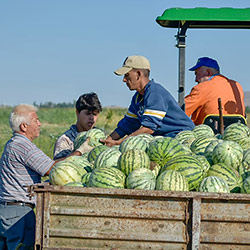 In a private sector collaboration, the Swiss Increasing Market Employability Program (IME) has launched an initiative in North Macedonia’s sustainable agribusiness sector. This intervention sets out to achieve several critical goals, including implementing a contract farming model for planned production, strengthening the supply chain, increasing the number of watermelon producers, and providing training and mentorship from seasoned agronomists.
In a private sector collaboration, the Swiss Increasing Market Employability Program (IME) has launched an initiative in North Macedonia’s sustainable agribusiness sector. This intervention sets out to achieve several critical goals, including implementing a contract farming model for planned production, strengthening the supply chain, increasing the number of watermelon producers, and providing training and mentorship from seasoned agronomists.
Ema Jakimovska
Swiss Increasing Market Employability Program - IME
LinkedIn
Gabriela Micevska
Swiss Increasing Market Employability Program - IME
gabriela.micevska@thepalladiumgroup.com
Read the full article
The Swiss Increasing Market Employability Program - IME has joined forces with ‘Fresh Line’, a prominent four-party logistics company based in the Balkan region, with a unique business model, which combines its own production with joint ventures and buyouts from specialized growers. The production came because of a unique demand relationship with buyers in Germany, Sweden, Czech Republic, and Poland, including supermarket chains like REWE Group and COOP. The intervention is characterized by a comprehensive approach encompassing production and post-harvest handling.
Within this modality, IME is co-financing crucial project components, including acquiring high-quality seedlings, certifying the value chain, and providing technical assistance to farmers, by supporting activities such as: engaging experienced mentors - agronomists, obtaining food safety and social certifications, creating educational materials, and seedling production costs. Fresh Line's substantial investment includes procurement of high-quality seeds, co-financing seedling costs, food safety certification, and expenses for packaging and logistics to the EU market. The contract farming model of cooperation led to increased sales for local farmers, enhanced product quality, and access to new international markets.
Four major producers have been strategically chosen, spreading across 32 hectares in different regions of Shtip, Strumica, and Demir Kapija. These locations have been carefully selected to optimize watermelon production, with planting techniques fine-tuned to extend the harvesting season from June to August. Furthermore, they offer an ideal environment to produce seedless watermelons, thanks to a combination of favorable climatic, soil, and geographical conditions. With a Mediterranean climate featuring warm, dry summers and mild, wet winters, these regions provide an extended growing season free from frost - a key requirement for watermelon cultivation.
Contract Farming as a Preferred Model for North Macedonia’s Agribusiness Sector
Within the challenges in North Macedonia, where farmers face distrust, disappointment, limited cooperation, and restricted market access, contract farming emerges as a potential remedy. Playing a pivotal role in modern agricultural practices, this collaborative approach involves formal agreements between farmers and companies, providing a secure market for produce and stability in income. Agribusinesses benefit from a consistent and quality supply of raw materials, fostering innovation and improved agricultural techniques. Contract farming offers traders and exporters of fresh fruits a secure and consistent supply of high-quality produce, reducing market uncertainties. This collaborative arrangement facilitates better planning, efficient resource utilization, and access to a network of reliable farmers. Additionally, it promotes the transfer of agricultural best practices and technologies, enhancing overall productivity and ensuring a sustainable supply chain.
This mutually beneficial partnership enhances productivity, ensures food security, and contributes to the overall sustainability of the agricultural sector.
Private Sector Engagement Modality and the Comprehensive Production Process
This initiative represents a pioneering effort, as seedless watermelons are not traditionally grown in the country. The innovative approach not only encompasses the cultivation of the product but also the introduction of a contract farming model, a partnership with a nursery for seedling production, and the deployment of experienced agronomists for on-site oversight, mentorship, and knowledge transfer with each of the involved partner partners.
What sets ‘Fresh Line’ apart is not only the product itself, but also the innovative production model. Fresh Line's role as a comprehensive supply chain integrator is pivotal in this cooperation. The company organizes the entire production process, from contracting with farmers and seed suppliers to overseeing and mentoring the production of high-quality seedlings, providing invaluable know-how, and ensuring advisory services for every step of the process. This private sector engagement modality efficiently addresses various deficiencies while establishing robust linkages with farmers.
To ensure high-level quality and compliance, ‘Fresh Line’ has taken decisive steps towards obtaining International Featured Standards (IFS) certification process for the packing facility, ensuring compliance with high-quality and safety standards. Additionally, the company invested in obtaining both Global Good Agricultural Practices (GAP) and Global Social Practice (GRASP) certifications, demonstrating its commitment to sustainable and socially responsible agricultural practice on a farm level. This dedication to certification proves Fresh Line's commitment to excellence and their steadfast pursuit of industry-leading standards, in accordance with the requirements of the leading European supermarket chains.
With the support of the Swiss Increasing Market Employability Program - IME implemented by the Palladium Group, ‘Fresh Line’ aims to achieve broader transformation in the watermelon value chain, ensuring the long-term sustainability of their investment. By offering full support to farmers in transitioning from conventional to seedless watermelon production, coupled with secured buyers, they aim to increase seedless watermelon production for export.
Successfully Managing and Overcoming Challenges
The journey wasn't without its trials. Despite the groundbreaking efforts, the project encountered challenges, notably heavy rains in April, making the seeding process arduous. The solution was to engage 120 additional seasonal workers, which ensured the project stayed on track. Challenges persisted during the ripening phase, as a water supply issue plagued one of the major producers in the Shtip area, resulting in a significant reduction in yield.
Nevertheless, the producers displayed resilience and adaptability. Despite the challenges, the partner farms managed to produce and sell 480 tons of seedless watermelons, with majority making their way to ‘Fresh Line’ for export in Germany and the Czech Republic, while the remaining products found a market domestically.
Higher-than-expected earnings per kilo but also reduced transportation costs resulted in total earnings from the seedless watermelon export amounting to 153,000 CHF. The buyout price of the watermelon was around 63% higher than what was originally agreed between the four producers and ‘Fresh Line’, which represents an additional incentive for farmers to continue and increase production for the years to come.
Empowering Farmers through Knowledge Transfer and Capacity Development
In the heart of the development intervention also lies a firm focus on knowledge transfer and capacity development. Seasoned producers and agronomists with extensive expertise in seedless watermelon production have been appointed, providing invaluable oversight and guidance at every stage of the process. Their proficiency in utilizing bio-stimulators is bound to foster continuous elevation of quality, and the establishment of a long-term, reliable production.
What is more, the project also incorporates educational videos illustrating the entire process ‘from farm to consumer’ for seedless watermelon cultivation, through the specialized information platform for the agricultural sector in the country ‘Agrotim’. Through interviews, media coverage, and case studies showcasing the applied technology and profitability of this production, more farmers will become acquainted with the opportunity, spurring interest in participating in seedless watermelon contract farming next year. It is also worth noting that ‘Fresh Line’ has been recognized as a role-model in contract farming in the country, by receiving the ‘Award for Promotion and Development of Contract Farming in North Macedonia’, issued by the media outlet ‘Modern Agriculture’.
Producers Remain Optimistic about the Future
Following the pulse of EU markets, ‘Fresh Line’ envisions a continued partnership with the farmers and extending the contract farming arrangements with other farms for production of seedless watermelons on more hectares for next year. This intervention not only represents a milestone in seedless watermelon production, but also showcases an effective model of cooperation between producers, traders, and other industry experts.
Having all this into account, the entire comprehensive approach, driven by the private sector engagement modality will strengthen the related value chain in North Macedonia, ensuring long-term sustainability. With continued support, this venture is set to redefine the agribusiness landscape and open new doors for Macedonian farmers. The future looks bright for both ‘Fresh Line’ and the local farmers, as they embark on a journey of sustained economic growth and increased employment, especially in the rural areas.
The Increasing Market Employability Programme (IME) is aimed at strengthening the business sector in the Republic of North Macedonia. Our mission is to create an enabling environment for our identified high-growth target sectors: Sustainable Agribusiness, Adventure Tourism and Information and Communication Technology (ICT). We aim to expand markets and boost competitiveness amongst domestic players in these sectors, to catalyse an overall improvement in the quality of products and services and create sustainable and decent jobs for high-skilled labour force in North Macedonia, especially women and youth.
Sparking inclusive change through an innovative saving system for smallholders
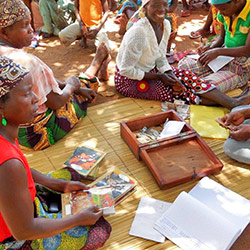 Using the "Adopt, Adapt, Expand, and Respond" framework, the SDC funded PROMAS (Promoting Sustainable Agricultural Market Systems) project seeks to expand market systems inclusively in Mozambique. This article highlights the "Fundo Agricola" an innovative savings systems, that promotes access to inputs by smallholder farmers. Learn more on how facilitating greater systemic response will accelerate inclusive change .
Using the "Adopt, Adapt, Expand, and Respond" framework, the SDC funded PROMAS (Promoting Sustainable Agricultural Market Systems) project seeks to expand market systems inclusively in Mozambique. This article highlights the "Fundo Agricola" an innovative savings systems, that promotes access to inputs by smallholder farmers. Learn more on how facilitating greater systemic response will accelerate inclusive change .
 Fauna Ibramogy
Fauna Ibramogy
Swiss Agency for Development and Cooperation
fauna.ibramogy@eda.admin.ch
Members' Articles: Agroecological Transitions
New training material on transition to agroecology
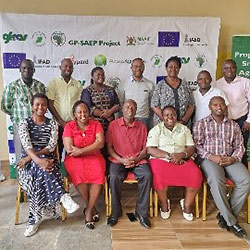 Looking for training material to empower farmers to transition towards agroecological practices?
The Global Forum for Rural Advisory Services (GFRAS) is proud to introduce a set of comprehensive training materials, that were developed in line with the Global Programme for Small-Scale Agroecology Producers and Sustainable Food Systems Transformation (GP-SAEP). The material emphasizes key competencies essential for facilitating change effectively and is currently being tested. Read more to learn how you can join GFRAS to promote agroecological transitions globally.
Looking for training material to empower farmers to transition towards agroecological practices?
The Global Forum for Rural Advisory Services (GFRAS) is proud to introduce a set of comprehensive training materials, that were developed in line with the Global Programme for Small-Scale Agroecology Producers and Sustainable Food Systems Transformation (GP-SAEP). The material emphasizes key competencies essential for facilitating change effectively and is currently being tested. Read more to learn how you can join GFRAS to promote agroecological transitions globally.
 Ingrid Oliveira Silva Kelle
Ingrid Oliveira Silva Kelle
Global Forum for Rural Advisory Services
LinkedIn |
ingrid.oliveira@g-fras.org
Read the full article
In a bid to support farmers in their agroecological transition, the Global Forum for Rural Advisory Services (GFRAS) has developed a training material focused on building capacities of Rural Advisory Service (RAS) providers. Currently undergoing testing via a four-day training in Uganda, the material will soon be rolled out in Madagascar, Ecuador, and Costa Rica, marking a significant stride towards global agricultural transformation.
Key Competency Areas:
The training material delves into critical competency areas essential for RAS facilitators:
- Personal Development: Encouraging self-awareness and fostering systems thinking.
- Team Development: Cultivating collaboration and adeptly managing group dynamics.
- Facilitation and Communication: Enhancing persuasive communication and facilitation skills.
- Agroecology Technical Competencies: Understanding principles of agroecology and proficiency in digital tools.
- Conceptual, Organisational, and Methodological Competencies: Implementing action learning approaches and participatory methods fostering co-creation of knowledge.
Capacity Development Structure:
The training adopts a blended approach, incorporating workshops, field practice, and virtual interactions spanning 30 months (project duration). Each phase integrates hands-on activities, peer learning, and technical support to ensure holistic skill development of RAS providers with the farmers.
Orientation Workshop Structure:
The inaugural face-to-face workshop covers fundamental aspects including agroecology principles, systemic change management, participatory approaches for co-creation of knowledge, and project implementation strategies.
Get Involved:
This comprehensive training material is not limited to RAS providers but is also available to partners interested in promoting agroecological transitions globally. Join us in this transformative journey towards sustainable agriculture! Whether you're a facilitator or a partner organization, this resource offers valuable insights and practical tools to drive positive change.
Stay tuned for further updates on accessing the material and upcoming training sessions from GFRAS. We are soon moving to the field.
La gestion de la fertilité des sols à l’épreuve de la réalité
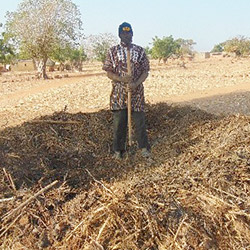 Dans l’Est du Burkina Faso, l’ONG belge Iles de Paix a mené de front avec l’association pour la recherche et la formation en agroécologie (AFRA) un projet visant à améliorer la production agricole via la gestion de la fertilité des sols. Il s’agit là d’une mise en pratique du principe agroécologique qui recommande de « garantir et améliorer la santé et le fonctionnement du sol » constituant un élément clé pour renforcer la résilience de l’agriculture familiale. Découvrez les apprentissages qui résultent de cette expérience.
Dans l’Est du Burkina Faso, l’ONG belge Iles de Paix a mené de front avec l’association pour la recherche et la formation en agroécologie (AFRA) un projet visant à améliorer la production agricole via la gestion de la fertilité des sols. Il s’agit là d’une mise en pratique du principe agroécologique qui recommande de « garantir et améliorer la santé et le fonctionnement du sol » constituant un élément clé pour renforcer la résilience de l’agriculture familiale. Découvrez les apprentissages qui résultent de cette expérience.
 Oliver Genard
Oliver Genard
Iles de Paix – Belgique
olivier.genard@ilesdepaix.org
Read the full article
La gestion de la fertilité des sols à l'épreuve de la réalité
S’engager dans la transition agroécologique, c’est choisir un chemin qui n’est ni à sens unique, ni linéaire. Mais pour s’orienter, les 13 principes agroécologiques repris par le Groupe d’experts de haut niveau sur la sécurité alimentaire et la nutrition (HLPE) constituent une solide boussole.
Sur papier, ces principes semblent assez limpides. Toutefois, tous les acteurs engagés dans la transition agroécologique en conviendront, leur mise en pratique s’assimile à un jeu d’équilibriste et le contexte peut complexifier encore davantage la mise en œuvre de certains de ces principes.
Au Burkina Faso, comme dans d’autres pays de la zone sahélienne, la forte croissance de la population contribuant à l’abandon de la jachère et accentuant la pression sur les ressources naturelles, ainsi que l’exposition aux effets du changement climatique, entraînent depuis plusieurs années une dégradation des sols cultivés. Les cultures vivrières (sorgho, mil, maïs et riz) produites et consommées par les paysans burkinabé, tout comme les cultures de rente (sésame, arachides,…), subissent des pertes de rendement régulières. La crise sécuritaire qui sévit de façon exponentielle depuis 2016, entraînant à la fois un abandon de terres agricoles et un nombre important de déplacés internes, accentue encore la pression sur les terres cultivées.
La gestion de la fertilité des sols est donc un enjeu crucial pour atténuer les effets néfastes de la pression démographique et des changements climatiques, et ainsi améliorer la résilience des agriculteurs.trices et la sécurité alimentaire. Les techniques et solutions préconisées par les programmes de développement mis en œuvre dans ce domaine depuis 60 ans sont nombreuses : développement de l’irrigation, promotion de l’utilisation d’intrants chimiques, lutte contre les ravageurs, production de compost, modernisation des équipements, cordons pierreux, association de cultures, etc. Cependant, force est de constater que les résultats de ces initiatives restent mitigés. En effet, dans ce pays où 70 % de la production nationale agricole est produite par des producteurs.trices sur petite surface, pratiquant principalement une agriculture de subsistance, les taux d’insécurité alimentaire et de pauvreté restent très élevés, et les sols continuent de à se dégrader.
Iles de Paix est une, ONG belge ayant opté pour la promotion de l’approche agroécologique comme moyen pour améliorer les conditions de vie des producteurs de petite échelle et contribuer à l’émergence de systèmes alimentaires durables. Dans cet esprit, l’organisation souhaite partager les apprentissages récents issus d’un projet mené de front avec l'ONG burkinabè ARFA (Association pour la Recherche et la Formation en Agroécologie). Ce projet, nommé Ten Viiga, visait à améliorer la production agricole via la gestion de la fertilité des sols dans l’Est du Burkina Faso. Il s’agit là d’une mise en pratique concrète du principe agroécologique de la santé des sols, élément clé pour renforcer la résilience des agriculteurs familiaux et de leurs exploitations. Car comme le dit l’adage :
« Nourris et prend soin du sol, si tu veux que le sol te nourrisse ».
Après trois années de mise en œuvre, malgré les difficultés rencontrées, le chemin parcouru avec les producteurs.ices a fait apparaitre des résultats encourageants :
- Le succès des bandes enherbées, dont les producteurs ont perçu de nombreux avantages économiques en plus de leur action de lutte contre l’érosion hydrique ;
- Une production et une utilisation accrue de différents types de composts promus par le projet, mais également une amélioration de la qualité et des effets du compost paysan traditionnel ;
- Une adoption large des techniques d’agroforesterie, et en particulier la régénération naturelle assistée, à la fois par les bénéficiaires directs du projet mais également au sein des communes de la zone d’intervention.
Plus spécifiquement, en ce qui concerne la transition agroécologique, le projet Ten-Viiga souligne deux éléments clés pour quiconque souhaite l'accompagner, que ce soit en tant qu’acteurs de développement ou en tant que partenaires financiers.
D’abord, la nécessité de s’engager dans cet accompagnement avec humilité et avec une bonne dose d’agilité et de curiosité. C’est nécessaire car le mythe de la solution unique pouvant se répliquer en mode « copier-coller » n’existe pas en agroécologie. Le cas du zaï mécanisé en est une belle illustration. Adopté avec succès à dans des territoires distants de quelques centaines de kilomètres à peine de ceux de la zone d'intervention de Ten-Viiga et au profil sahélien assez similaire, dans la zone du projet le zaï mécanisé s'est révélé moins prometteur qu'attendu. Mais à force d'écoute et de créativité, les obstacles rencontrés ont été féconds en solutions non "programmées". Saisir ces dernières, demande de la flexibilité tant dans le chef de l’équipe projet que dans les modalités de programmation exigées par le partenaire financier.
Ensuite, la forte interconnexion entre les éléments ou principes de l’agroécologie tels qu’édictés par le HLPE et la FAO. Avancer sur le chemin de la transition agroécologique, ce n’est pas travailler de façon séquencée sur un élément puis un autre, mais au contraire progresser de façon simultanée sur autant d’éléments que possible. Comme on l’a dit, le projet Ten-Viiga est avant tout une mise en pratique concrète du principe agroécologique de la santé des sols. Mais les résultats obtenus l’ont été à la faveur de la prise en compte de toute une série d’autres principes de l’agroécologie, parmi lesquels on retiendra particulièrement le principe de co-création des connaissances dont le cas du compost paysan amélioré vécu dans le cadre du projet est un bel exemple, le principe des synergies ou encore le principe de la diversification économique qui explique le succès rencontré pour les bandes enherbées ou l’intégration d’arbres fruitiers.
Les apprentissages de ce projet sont présentés de façon beaucoup plus détaillée dans un dossier de capitalisation intitulé "La gestion de la fertilité des sols à l'épreuve de la réalité". Ce dossier peut être téléchargé gratuitement en français, en anglais et en espagnol sur le site internet d'Iles de Paix.
Autres ressources :
Dossier détaillé
From fragmented to coordinated seed interventions
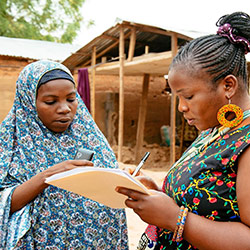
Across the fragile and conflict-affected states in Africa, smallholder farming communities face persistent structural challenges to access and use quality seed of adapted varieties that farmers prefer. Compounding these challenges are increased climate stresses that drive uncertainty and seed insecurity. By investing in and supporting a Nexus of Humanitarian, Development and Peacebuilding interventions in Africa’s seed sector, SDC and partners are working to deliver more effective and sustainable, longer-term impact. Learn more about the
Integrated Seed Sector Development in Africa Programme (ISSD Africa)
James Mulkerrins
Wageningen University & Research
LinkedIn |
james.mulkerrins@wur.nl
Read the full article
Accessing seed in times of crisis
The lack of access to quality seed of adapted varieties that farmers prefer is one of the key bottlenecks hindering agricultural development on the African continent. Particularly in fragile states in Africa, conflict and other protracted crises, as well as increasing climate stresses are compounding smallholder farmers’ challenges of accessing and using sufficient amounts of high quality, affordable and diversified seed of locally adapted varieties that farmers prefer. The result is lower resilience to continued shocks and stresses, lower farm income, reduced food and nutrition security and commonly, the unsustainable use of agrobiodiversity.
Seed sectors in fragile and conflict-affected states are regularly fragmented and dysfunctional; unable to meet seed demand due to weakened institutional capacities, governance breakdown and market disruption. Yet timely delivered and affordable quality seed1 is a key input for increasing crop productivity, and experts generally estimate that 50% of the yield gap can be closed through the use of quality seed.
From fragmented to coordinated seed interventions
In these fragile contexts, multiple actors respond to different challenges and priorities – humanitarian responders strive to meet immediate needs, often following an emergency; development practitioners focus on strengthening resilience and food security; and peacebuilding actors focus on improving social cohesion amongst divergent groups and addressing the root causes of the conflict. Given the importance of quality seed as a vital input for the agricultural system, seed-focused interventions are often a part of humanitarian and development responses. The seed sector is a critical component of the overall agricultural system and can yield quick returns for farmers, including for men, women and the most vulnerable.
Humanitarian and development partners are increasingly recognising the disconnect between the approaches they take, acknowledging that the lack of coordination and alignment between their activities is hampering progress and sometimes even creating contradictory activity pathways and outcomes. In their efforts to provide emergency seed aid, humanitarian interventions often weaken seed sectors in the long-term through the displacement of private sector actors, market flooding of inexpensive or free seeds, or bulk purchases of seed not suitable for the local climate or environment. And often, development projects and activities prioritise longer-term systemic outcomes at the expense of realising the short-term urgent needs of stakeholders in crisis.
To avoid these pitfalls and enable joint action and learning, enhanced connection and coordination is needed amongst humanitarian and development actors and policy makers. Together, these Nexus partners can identify and mutually design and support innovations that make seed sector interventions effective in fragile, conflict-affected and climate-stressed contexts in Africa. And by initiating and deepening collaboration with partners working specifically on peacebuilding in conflict contexts, humanitarian and development partners can ensure that their activities are conducted in a conflict-sensitive manner, that they adhere to Do No Harm principles and that their work to increase seed sector resilience also delivers on longer-term peace outcomes.
A Community of Practice on the HDP-Nexus for seed
The Integrated Seed Sector Development in Africa Programme (ISSD Africa) is a Community of Practice on seed sector development on the African continent. Active in various forms since 2012, ISSD Africa unites African and international public, private, civic and knowledge-focused organisations around commonly experienced bottlenecks and potential solutions for seed sector development in Africa. Together, partners conduct action research and engage in knowledge development and exchange. A key focus of ISSD Africa is to enable African-grown solutions and to support connection across levels, from field to forum.
Through continued SDC support, ISSD Africa has just kick-started its new phase, focusing on advancing the HDP-Nexus in Africa’s seed sector. Until the end of 2027, ISSD Africa will facilitate a range of knowledge-sharing activities and events, with the core of the action research taking place in four distinct, yet complementary, Action Learning Projects (ALPs).
Each ALP is led by reputable partners working on seed, from a humanitarian and development perspective in Africa. In turn, these lead partners convene and facilitate a diverse array of local and international partners to jointly agree upon and execute action learning activities. While still to be confirmed, initial plans for ISSD Africa action research will see activities in at least ten African countries, namely, Burkina Faso, Central African Republic, the Democratic Republic of the Congo, Ethiopia, Mali, Niger, Nigeria, Somaliland, South Sudan and Sudan.
Introduction to the Action Learning Projects (ALPs) of ISSD Africa
ALP-1: Resilient and diverse seed systems
Led by the Alliance of Bioversity International & CIAT, action research activities under ALP-1 focus on farmer-managed seed systems, exploring strategies and policies around community seed banks in protracted crisis situations, as well as local crop diversification and participatory crop improvement strategies and methods. The ALP’s outputs enable learning on effective strategies to boost crop and varietal diversity and will advance the recognition and support of community seed banks and the registration of farmer varieties.
ALP 2: Humanitarian seed response in fragile and conflict affected states
Led by Mercy Corps and SeedSystem.org, activities under this ALP will unpack how the effects of conflict differentially impact vulnerable stakeholders. The ALP will explore modalities for increasing the long term effectiveness of humanitarian seed interventions targeting these vulnerable groups. Further, action research with partners will enable learning on how to increase the uptake of existing knowledge and decision making resources in support of seed interventions in fragile contexts.
ALP 3: Seed business development in fragile contexts
Led by Mercy Corps and IFDC, this ALP will identify, validate and promote market based interventions that are effective in building seed sector performance and resilience in fragile contexts. Activities will help identify and promote business models that enable informal and formal private seed sector stakeholders to better prepare for and respond to shocks and stresses. In doing so, the ALP will develop and adapt knowledge resources to supporting scaling of effective strategies and methods of supporting local markets and market actors to sustain seed sectors in times of crisis.
ALP 4: Seed governance and peace
Led by Wageningen University & Research, collaborative activities under this ALP will explore how seed sector governance in fragile and conflict affected states can contribute more effectively to peacebuilding and thereby strengthened food and nutrition security outcomes. The ALP will elaborate governance mechanisms that overcome fragility--, conflict--, or disaster induced disruptions and better facilitate coordination and synergy among HDP Nexus actors working in seed sectors in fragile states.
Further, the ALP will validate and promote mechanisms that promote transparency, accountability, distributed decision making and improved information sharing in seed sectors in fragile states.
The ISSD Approach
Underpinning all of the ALPs and work of ISSD Africa are the approach and Guiding Principles for Integrated Seed Sector Development (ISSD). The ISSD approach supports the establishment of seed sectors that are tailored to national realities. The ISSD approach promotes pluralism, recognizing the value of formal, intermediary and informal seed sectors. In doing so, it steps away from a one-size-fits-all approach to seed sector design and function, and cherishes the diversity of systems and pathways by which seed of different crops is produced, exchanged, and used for and by farmers with different needs. The ultimate goal of the ISSD approach is to enhance reliable access of female and male smallholder farmers to sufficient quantities of quality seed of desired varieties at an affordable price. ISSD strives to increase farmers' choice in terms of crop varieties, seed quality, price and market outlets, to cater for the diversity of needs of African farmers.
Contributing to policy development and implementation
A key deliverable of ISSD Africa is to bridge policy and practice. Many of the members of the CoP are based in public institutions with a regulatory and decision-making capacity in their own national seed sectors. The collaborative nature of the programme’s action research and the emphasis placed on knowledge-sharing activities enables discussion and validation of emerging insights from a policy context. Under each ALP, specific investments are made to develop policy briefs and policy-oriented workshop processes.
ISSD Africa also partners strategically with important policy-focused bodies with the aim to scale and embed our insights and products at (trans)national levels. The CoP has a longstanding collaboration with the African Union Commission, under the umbrella of the African Seed & Biotechnology Platform (ASBP). The ASBP is operationalised through a Partnership Platform (ASB-PP) which convenes a Steering Group and numerous Working Groups and Clusters. Together, we have partnered to deliver three separate Communiqués on Integrated Seed Sector Development in Africa. The Communiqué endorses and give impetus for intensive investment and collaboration across both platforms. In fact, the launch event of ISSD Africa HDP-Nexus is currently being organised in partnership with the ASB-PP Secretariate, FARA Africa. The event is planned for April 2024 and is currently envisaged to bring over one hundred well-placed professionals from a diversity of national and continental bodies.
An ever-expanding platform
ISSD Africa HDP-Nexus has now begun its activities. Yet we continue to seek out collaboration with new partners and are ready to collaborate on new activities. If you are interested to know more and join this growing platform, we are happy to connect and share opportunities to learn.
Further resources:
2024, Year of Camelids – an underrated animal for climate resilience
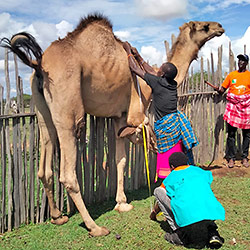 Why caring about camels when millions of people are going hungry? Contacted by FAO to produce a video on “local heroes”, the result of this work is a testimonial on the multiple values of an often underestimated animal. Learn more how the animal contributes to strengthen equality, nutrition security and climate resilience of drylands by takinga glimpse at VSF-Suisse project work in Isiolo, Kenya. [Link to video on youtube]
Why caring about camels when millions of people are going hungry? Contacted by FAO to produce a video on “local heroes”, the result of this work is a testimonial on the multiple values of an often underestimated animal. Learn more how the animal contributes to strengthen equality, nutrition security and climate resilience of drylands by takinga glimpse at VSF-Suisse project work in Isiolo, Kenya. [Link to video on youtube]
 Genevieve Owuor
Genevieve Owuor
Vétérinaires Sans Frontières Suisse (VSF-Suisse)
LinkedIn |
genevieve.owuor@vsf-suisse.org
Read the full article
VSF-Suisse is intervening in the Camel Milk value chain in Kenya for nearly ten years, supported by Biovision, SDC and other financial partners. While substantial progress has been achieved in the historic stronghold of the organisation, Isiolo, the activities have more recently been expanded to Samburu county. While the different projects have been and continue being crucial for the livelihoods both of those rearing the camels, the women involved in processing the milk, and the most vulnerable groups such as children and breastfeeding women depending highly on the nutritive values of the milk (rich in vitamine C), the engagement for Camels goes along with developing strategies together with local authorities (County level) to upscale the activities and, to ensure that the capacities of extension services are maintained beyond the project. The Guidelines for the Training of Veterinary Professionals on Camel Health Diseases are celebrating their 10th Anniversary in 2024: their recent translation into a Kisuahili Camel Extension Manual is the best proof of its usefulness for the veterinary professionals. The aim is to improve the availability and accessibility of teaching material on camel health and disease topics, especially for those veterinary professionals already working with camel keeping communities. It is anticipated to enhance the knowledge of these professionals on the most common camel diseases, their epidemiology, diagnosis and treatment covering the theory as one aspect but focusing more on the practical side, to help veterinary professionals in their diagnosis when confronted with a sick camel in the field. Currently, VSF-Suisse is developing a camel milk strategy together with Isiolo county government.
Hence: Camels are useful in a long-term perspective of making livelihoods in pastoral contexts more resilient and developing the potential of high-value markets; and they can be vital in short-term livestock emergency interventions, such as promoted in the livestock emergency guidelines and standards (3d edition, 2023: link).
Further resources:
Members' Articles: Food systems
Enhancing governance and policy impact on food systems in Bangladesh
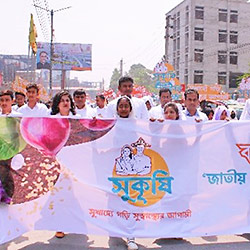
The NICE (Nutrition In City Ecosystems) project aims to improve food security and nutrition in urban areas of Bangladesh. Faced with the increasing prevalence of malnutrition and challenges posed by rapid and unplanned urbanization, NICE collaborates with local governments to integrate food security and nutrition into municipal agendas. Read more about how the project encourages multisectoral collaboration and promotes policies and programs to ensure equitable access to healthy diets for all urban inhabitants.
Revolutionizing food systems through human rights and equity
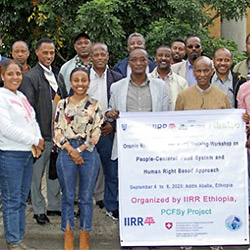
The People-Centered Food System (PCFSy) Project
led by Columbia University aims to integrate human rights into food policies. Across Cambodia, Ethiopia, Uganda, and Honduras, it enhances capacities, advocates for the inclusion of food rights in constitutions so that food systems transformation leave no one behind.
While human rights provide legal frameworks and minimum standards, equity principles address deeper issues of inequality and power
imbalancesDiscover how workshops, high-level consultations, and policy analysis reports are underway to foster equitable food transformations.
 Myrtel Anne G. Valenzuela
Myrtel Anne G. Valenzuela
International Institute of Rural Reconstruction (IIRR)
LinkedIn |
myrtelanne.valenzuela@iirr.org
Read the full article
No Farmers, No Food – This global tagline resonates with millions. However, the reality is alarming, as a significant number of the world's nearly eight billion people, including many women and children, suffer from malnutrition. Shockingly, 3 billion people lack access to what the United Nations defines as a healthy diet, leading to a rise in diet-related non-communicable diseases due to food insecurity.
These numbers primarily consist of individuals engaging in food systems, including those who cultivate and produce the food we consume. Farmers and agricultural workers, pivotal actors in our food systems, frequently fall victim to human rights violations, such as the right to food, fair wages, and safe working conditions. Unfortunately, these rights have not been adequately respected, protected, or fulfilled for those involved in food systems, whether in production or consumption. Therefore, governments and influential entities must acknowledge the full range of human rights that pertain to food systems and employment.
About the Project
The People-Centered Food System (PCFSy) Project, led by Columbia University in collaboration with partners such as the Alliance of Biodiversity International and CIAT, the International Institute of Rural Reconstruction (IIRR), and RIKOLTO and formerly, Johns Hopkins University, operates in four pilot countries: Cambodia, Honduras, Ethiopia, and Uganda. The project integrates human rights into food system policies, empowering vulnerable populations to assert their rights through advocacy, capacity building, and accountability tools.
This integration includes promoting human rights-based approaches and equity principles, which work hand-in-hand to ensure fair food system transformations that leave no one behind, especially marginalized groups. While human rights provide legal frameworks and minimum standards, equity principles address deeper issues of inequality and power imbalances. Together, they offer a perspective on transforming food systems to be more inclusive and just. The PCFSy Project promotes several instruments to deliver activities that integrate human rights frameworks and equity principles within food system policy and actions, including the 2018 United Nations Declaration on the Rights of Peasants and Other People Working in Rural Areas (UNDROP), the 2017 Voluntary Guidelines on Land Tenure (VGGT), the 2021 Voluntary Guidelines on Food Systems and Nutrition (VGFSyN), and the 2004 Voluntary Guidelines to support the Progressive Realization of the Right to Food (VGRTF).
Country Team Activities
Cambodia: IIRR empowered communities through capacity-building activities, engaging 599 participants to enhance their knowledge and skills. A significant achievement was the training workshop in June 2023, where IIRR collaborated with local CSOs/NGOs. Supported by audio-visual materials from Johns Hopkins University, the training provided a deep dive into food systems and human rights. Moreover, the partnership with SAORI, an NGO focused on empowering persons with disabilities (PWDs), further strengthened the inclusivity of PWDs, women, and youth in the roadmap of improving Cambodia’s food systems.
IIRR collaborated with the Council for Agricultural & Rural Development (CARD), the Alliance of Bioversity and CIAT, and WorldFish to integrate the PCFSy project with the CGIAR's Asian Mega Deltas initiative. This alignment aimed to enhance productivity and resilience in Asian deltas. Through a consultation workshop, stakeholders and producers reviewed past actions and planned for sustainable production, emphasizing crop, fish, and animal diversification, and climate resilience for food security and nutrition from farm to table.
Ethiopia: IIRR conducted capacity-building activities for 252 participants focusing on sustainable food systems to empower women and youth. A highlight was a training-workshop in September 2023, attended by stakeholders from federal ministries, Oromia Regional State Bureaus, bi-laterals, and NGOs/CSOs. The workshop aimed to enhance understanding of People-Centered Food Systems and the Human Rights-Based Approach, with practical application for transforming the Ethiopian Food System. Discussions highlighted the absence of the right to food in the Ethiopian constitution and sub-optimal implementation of existing legal and policy provisions, along with a lack of effective accountability mechanisms. Participants emphasized the need to advocate for including the right to food and other socio-economic rights as legally enforceable provisions in the constitution for a long-term solution.
Another notable achievement is the collaboration with SOS Sahel Ethiopia & MELCA-Ethiopia to finalize the design of a significant initiative, the Massive Youth Employment in Apiculture (MaYEA) project. The Mastercard Foundation has agreed to provide funding for PCFSy, which will empower a broader segment of the population to actively participate in and benefit from the development of sustainable food systems in Ethiopia.
Uganda: Capacity-building activities engaged 303 participants. A significant highlight was the 3rd National Stakeholders’ Consultative Workshop, which focused on expediting Uganda’s Food Systems Strategic Analysis and Food Systems Transformation Action Planning. This event was co-organized with high-level offices such as the Office of the Prime Minister and UN FAO. During the workshop, the importance of the PCFSy approach in Uganda's food systems transformation process was emphasized. It was highlighted that marginalized and rural poor producers should be prioritized, as they play a significant role in global, regional, national, and local food systems. Additionally, IIRR organized a Round Table Discussion (RTD) on the processes necessary for Fostering People-Centered Food Systems in the National Food Systems Transformation Action Planning, engaging various stakeholders. This workshop reaffirmed that the human-rights-based approach is increasingly gaining recognition in global food systems transformation and is becoming important in national, regional, and local food systems transformation agendas globally.
Honduras: Led by RIKOLTO, capacity-building efforts resulted in training a total of 1,097 participants. A notable highlight was the training of trainers for promoters and educators from the Office of the National Commissioner for Human Rights in Honduras (CONADEH) offices at the national level. The training focused on human rights related to food and the systematic handling of complaints related to these rights. This will help replicate in communities and strengthen the knowledge in rural areas regarding human rights and equity. In addition, RIKOLTO conducted workshops for local farmers and women advocates to embrace gender sensitization and person-centered food systems in November 2023. These workshops aimed to create a conducive learning environment where participants could acquire and reinforce knowledge on gender sensitization and person-centered food systems, all approached through the lens of human rights and equity.
Direction Towards Policy
Aside from capacity-building workshops done by countries, a plan on analysis report on policy coherence led by Alliance Bioversity International and CIAT is underway. This report covers a national policy review related to food systems following declarations: Declaration on the Rights of Peasants and Other People Working in Rural Areas (UNDROP), Voluntary Guidelines on Land Tenure; and Voluntary Guidelines on Food Systems and Nutrition among others.
To find out more about the project, visit
www.peoplecenteredfoodsystems.org
Systèmes alimentaires : pas sans les travailleurs agricoles
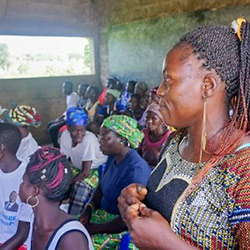
De nombreux projets se concentrent sur la formation des agriculteurs pour promouvoir la transition vers des systèmes de production agricole durables. Cependant, un acteur important est souvent oublié : les travailleurs agricoles.
Nicole Bolliger
Brücke Le Pont
LinkedIn | nicole.bolliger@bruecke-lepont.ch
Read the full article
Le travail agricole est un élément central d’un système de production agricole durable. Les méthodes de culture agroécologiques et leur application nécessitent davantage de bras pour aider dans les champs qu’une agriculture conventionnelle ou mécanisée. Cependant, dans de nombreux pays africains, les structures sociales évoluent : les jeunes partent en ville pour se former et trouver du travail, tandis que les personnes âgées restent dans les régions rurales. Cela entraîne une augmentation de la demande de travailleurs agricoles, soit pour toute des services individuels de courte durée, comme la récolte ou le labourage du champ, soit pour toute la phase de production. La mécanisation de l’agriculture peut aider, mais elle n’est pas suffisante.
Pour réaliser la transition agroécologique, il faut une main-d'œuvre qualifiée disposant des connaissances techniques nécessaires pour pratiquer une agriculture durable, ainsi que sa reconnaissance en tant que profession clairement identifiable. Ces deux éléments font défaut au Togo. Le manque de structuration des travailleurs rend difficile pour les agriculteurs d'entrer en contact avec eux pour les recruter. Le fait que les travailleurs* ne soient pas mis en réseau et ne soient pas reconnus en tant que groupe professionnel augmente en outre le risque de conditions de travail précaires et d'exploitation.
MAPTO, le syndicat des paysans et des paysannes du Togo, s'engage pour des systèmes alimentaires durables, équitables et sains. Dans la fiche thématique suivante, l'organisation montre comment le potentiel des travailleurs pourrait être utilisé dans le changement vers des systèmes de production durables et équitables ainsi que les obstacles rencontrés. La formation des travailleurs agricoles aux méthodes de culture agroécologiques et à leurs droits et obligations en matière de travail, ainsi que leur organisation en coopératives, soutiennent la reconnaissance et la professionnalisation du métier. La fourniture d'outils de travail, la négociation de prix indicatifs et l'élaboration de modèles de contrats de travail contribuent en outre à rendre le travail agricole plus attrayant. Cela permet également aux travailleurs agricoles d'offrir des services agroécologiques aux agriculteurs et de promouvoir ainsi un changement durable.
Autres ressources:
lien vers l'article complet (allemand)
Members' Articles: Digitalization
Global lessons in scaling up digital rural advisory solutions
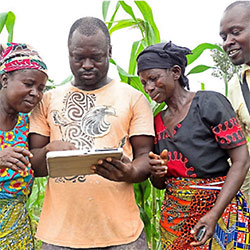
A newly published GFRAS report delves into the fusion of digital technologies and advisory services, highlighting potentials and challenges.. We navigate through diverse regions, adhering to the Principles for Digital Development, offering insights into public and private sector roles. Discover opportunities for public-private partnerships shaping the fortification of global food systems.
 Ingrid Oliveira Silva Kelle
Ingrid Oliveira Silva Kelle
Global Forum for Rural Advisory Services
LinkedIn |
ingrid.oliveira@g-fras.org
Read the full article
GFRAS is glad to launch its report "Digital Advisory Services: Global Lessons in Scaling Up Solutions", supported and financed by GIZ and BMZ, with co-funding by SDC.
We draw lessons from Anglophone and Francophone Africa, Latin America, and Southeast Asia, on how the digitalization of rural advisory services is shaping the landscape of agriculture. Our report meticulously examines the current potentials and challenges inherent in the fusion of digital technologies and advisory services, unravelling how this dynamic synergy is contributing to the fortification of global food systems.
Built on the bedrock of the Principles for Digital Development, a comprehensive set of guidelines for integrating best practices into technology-enabled development programs, our report offers a profound insight into the intricate web of experiences drawn from diverse regions. Discover how these principles act as a compass, steering the course toward effective, ethical, and impactful digital interventions in rural advisory services.
Delve into the report's exploration of the potential roles of both the public and private sectors in advancing digital advisory services. Uncover the dynamic interplay and synergies between these sectors and the innovative realm of public-private partnerships. Our findings shed light on how collaboration can be a catalyst for transformative change.
In the dynamic landscape of digital solutions for agriculture, both the public and private sectors play crucial roles in spearheading innovation through the development of advisory services and applications. The public sector, with its regulatory authority and broad societal focus, often ensures accessibility and inclusivity in the deployment of digital tools. On the other hand, the private sector, driven by market dynamics, excels in rapid technological advancements and tailored solutions. However, while each sector boasts distinct strengths, they are not without their pitfalls. The public sector may grapple with bureaucratic hurdles and slower adaptation to emerging technologies, whereas the private sector may prioritize profit over equitable access, potentially leaving certain demographics underserved. A nuanced exploration of the strengths and pitfalls of these sectors is essential to harness their collective potential for a more comprehensive and sustainable digital transformation in agriculture.
Far too few of the successful digitally supported rural advisory services systems are sufficiently scaled. Before investing in developing new costly systems, investors should consider investing in scaling existing effective and reliable systems, regardless of whether they are operated by public, private, not-for-profit actors or a combination of those.
Further resources:
Link to full report
News
New FAO report: “The unjust climate"
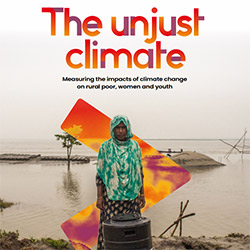
Developing measures to promote inclusive rural transformation processes requires better understanding of how climate change affects the livelihoods and economic behaviour of vulnerable rural populations, particularly women, young people and people living in poverty. This is the aim of the new FAO report entitled "The unjust climate", which brings together an impressive array of data from 24 low- and middle-income countries in five regions of the world. Read the full report to find out more about how climate stressors intersect with gender, age, and wealth. .
African perspectives on agroecology - new book published
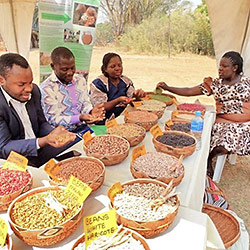 Despite minimal state and donor support, the ‘silent revolution’ of agroecological practices is taking root across Africa. Farmers, NGOs, and research teams are innovating and organizing to fight climate change, inequality, and hunger. The recently published book entitled “African Perspectives on Agroecology” includes contributions from the frontlines, assembling an array of reflections on the possibilities and constraints facing the wider adoption of agroecology and farmer-led seed system. The collection is a rejoinder to Afro-pessimism, and an inspiring call to action.
Despite minimal state and donor support, the ‘silent revolution’ of agroecological practices is taking root across Africa. Farmers, NGOs, and research teams are innovating and organizing to fight climate change, inequality, and hunger. The recently published book entitled “African Perspectives on Agroecology” includes contributions from the frontlines, assembling an array of reflections on the possibilities and constraints facing the wider adoption of agroecology and farmer-led seed system. The collection is a rejoinder to Afro-pessimism, and an inspiring call to action.
 Bulisani Ncube
Bulisani Ncube
Swiss Cooperation Office, Embassy of Switzerland, Harare
bulisani.ncube@eda.admin.ch
Read more
YPARD takes part in CEA-FIRST Inception Meeting
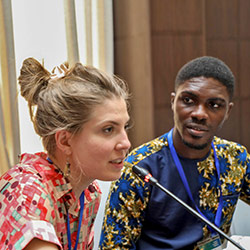 The Consortium Europe-Africa on Research and Innovation for Food Systems Transformation (CEA-FIRST) project comes under the AU-EU Research and Innovation Cooperation, and is funded by the European Union.
The Consortium Europe-Africa on Research and Innovation for Food Systems Transformation (CEA-FIRST) project comes under the AU-EU Research and Innovation Cooperation, and is funded by the European Union.
YPARD and CORAF, supported by CSIR Ghana, FARA, CIRAD, are leading the development of youth and gender specific strategies for this project. YPARD is strategically positioned in the fight against the shared challenges that are caused by imbalances in the world-particularly those with the food and agricultural systems.
 Trisha Mandal
Trisha Mandal
YPARD (Young Professionals for Agricultural Development)
LinkedIn |trisha.mandal@ypard.net
Read more
Practical production guide for black soldier fly published (Spanish)
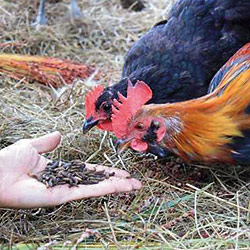
In recent years, black soldier flies have garnered increased attention as a valuable animal feed source. Their advantages lie in their ease of production, efficient utilization of waste, and rich nutritional content. This illustrative production guide, written in Spanish, specifically targets small livestock producers. The primary goal
is to close the production cycle a bit more by reducing feed imports and maximizing usage of waste. This gives the chance to simultaneously improve economic, environmental, and social conditions.
 Ludovico Schorno
Ludovico Schorno
Comundo
ludovic.schorno@protonmail.com
Read more
Events
Trip around Rio: Tackling the triple planetary crisis – Solutions for sustainable development
 Online | 24 April & 30 May 2024
Online | 24 April & 30 May 2024
The triple planetary crisis interlinking climate change, biodiversity loss, and pollution, forms an increasing burden for achieving the SDGs. The event series “Trip around Rio” will embark on a learning journey to gain a deeper understanding of the importance of biodiversity and ecosystem services for international cooperation beyond nature conservation. It seeks at providing an overview from global to local issues, including the most relevant global frameworks, sources of finances and good working practices on the ground. A special focus will be on discussing and developing innovative solutions & recommendations for SDC and its partners.
Who is who

Héloïse Bellenot
Academic Trainee, SDC
What do you love, or what is special, about your work?
What I love about my work is the variety of tasks and themes I get to work on. I can apply my knowledge of agroecology from my previous experiences in India while continually learning about health and food systems. Additionally, issues related to agriculture, food, and health, are particularly close to my heart. Contributing, even in a small way, to the SDC’s work in these areas is a great source of motivation. Furthermore, my colleagues come from very diverse professional and academic backgrounds. Everyone brings a unique perspective to the table. As a young professional, I find their varied paths truly inspiring and enlightening.
What is your favourite quote and why?
I like this quote from Rousseau’s
“Reveries of a Solitary Walker”: “Amidst the tranquility of nature, my thought find clarity, my soul finds peace, and my spirit finds renewal.” These words resonate with me because I spend a lot of time in nature outside of work to recharge. It helps me refocus and deal with the challenges of daily life. Furthermore, I find that it beautifully expresses the regenerative power of nature and the interconnectedness between humans and ecosystems.
What is the most important lesson you have learned from your work?
The most valuable lesson I have learned from my experiences in India is the importance of designing solutions rooted in the realities of the ground. To effectively address the needs of populations, it is essential to remain attentive to the evolving local living conditions and to maintain constant dialogue between the ground and higher decision-making levels. This is an aspect that I appreciate in my work here at SDC, where we strive to maintain close contact and foster exchanges with local stakeholders.
Additionally, I have learned that sustainable changes often require a great deal of patience and perseverance. It is often preferable to opt for gradual but solid results rather than quick but superficial solutions.
Héloïse has been working as an academic trainee for the SDC’s Food systems and Health sections since February 2024. She maintains the shareweb as well as the network and is responsible for the newsletter. During her Master’s degree in Asian studies (at the University of Geneva), she focused on agroecology. This included conducting field research in South India and completing an internship in an NGO in North India, where she gained valuable insights into the promotion of sustainable agricultural practices.
She has also worked on multilateralism as a research assistant at the Graduate Institute of International and Development Studies
Comic
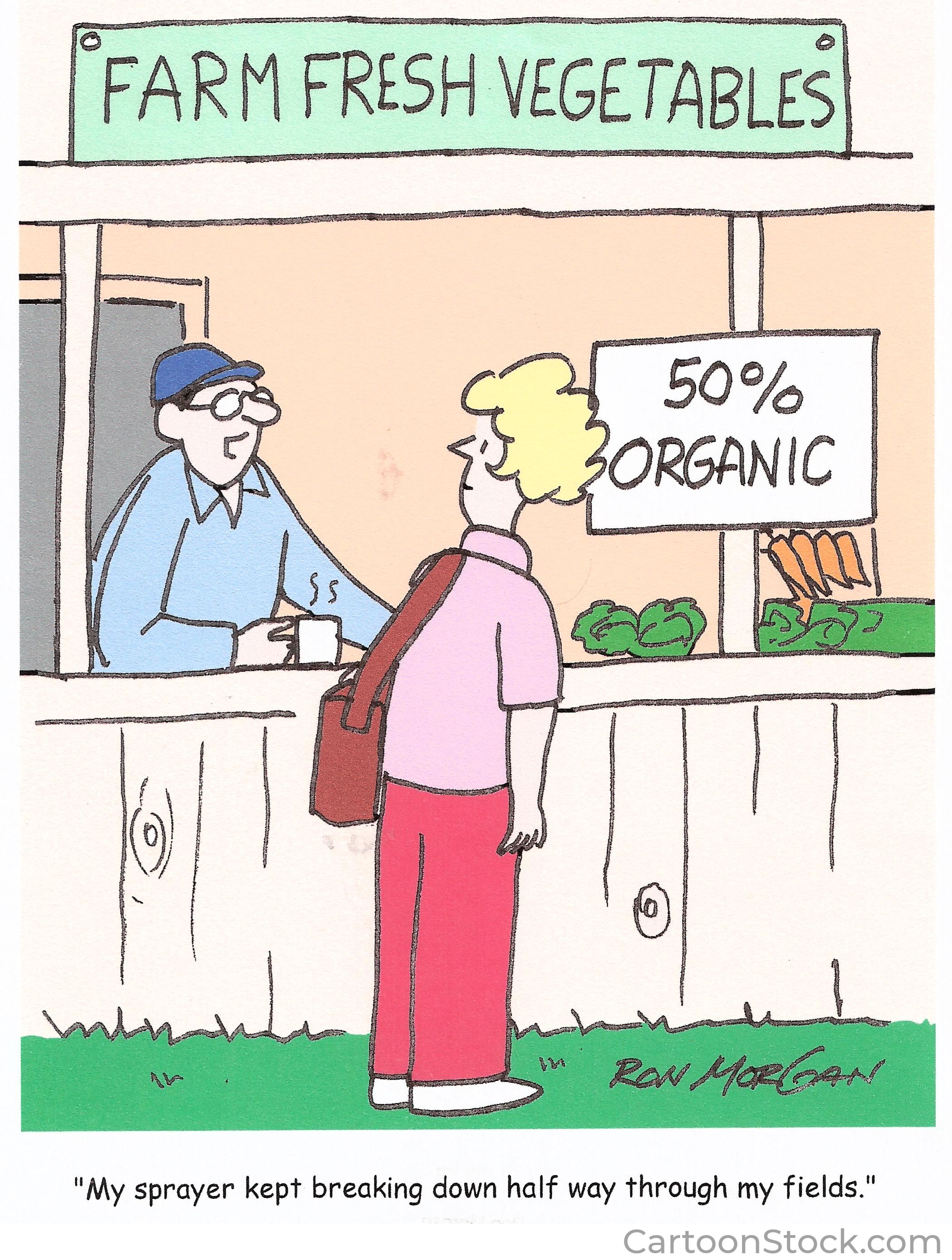
Past newsletters
Newsletter A+FS December 2023
Newsletter A+FS September 2023
Newsletter A+FS July 2023
Newsletter A+FS March 2023
Newsletter A+FS December 2022
Newsletter A+FS October 2022
Newsletter A+FS and e+i|EPS / June 2022 PDF, 365 KB
Newsletter A+FS and e+i|EPS / March 2022 PDF, 393 KB
Newsletter A+FS and e+i|EPS / December 2021 PDF, 572 KB
Newsletter A+FS and e+i|EPS / September 2021 PDF, 601 KB
Newsletter A+FS and e+i|EPS / June 2021 PDF, 544 KB
Newsletter A+FS and e+i|EPS / March 2021 PDF, 620 KB
Newsletter A+FS and e+i|EPS / December 2020 PDF, 491 KB
Newsletter A+FS and e+i|EPS / September 2020 PDF, 426 KB
Newsletter A+FS and e+i|EPS / June 2020 PDF, 477 KB
Newsletter A+FS and e+i|EPS / April 2020 PDF, 666 KB
Newsletter A+FS and e+i|EPS / December 2019 PDF, 437 KB
Newsletter A+FS and e+i|EPS / September 2019 PDF, 436 KB
Newsletter A+FS and e+i|EPS / June 2019 PDF, 327 KB
Newsletter A+FS and e+i / April 2019 PDF, 384 KB
Newsletter A+FS and e+i / December 2018 PDF, 317 KB
Newsletter A+FS and e+i / September 2018 PDF, 191 KB
Newsletter A+FS and e+i / June 2018 PDF, 217 KB
Newsletter A+FS and e+i / March 2018 PDF, 196 KB
Newsletter A+FS and e+i / December 2017 PDF, 176 KB
Newsletter A+FS and e+i / September 2017 PDF, 127 KB
Newsletter A+FS and e+i / June 2017 PDF, 176 KB
Newsletter A+FS and e+i / April 2017 PDF, 151 KB
Newsletter A+FS and e+i / December 2016 PDF, 106 KB
Newsletter A+FS and e+i / October 2016 PDF, 129 KB
Newsletter A+FS and e+i / July 2016 PDF, 110 KB
Newsletter A+FS and e+i / April 2016 PDF, 196 KB
Newsletter A+FS and e+i / December 2015 PDF, 108 KB
Newsletter A+FS and e+i / September 2015 PDF, 133 KB
A+FS Network Newsletter 05/2015 PDF, 373 KB
A+FS Network Newsletter 02/2015 PDF, 117 KB
A+FS Network Newsletter 10/2014 PDF, 1424 KB
A+FS Network Newsletter 07/2014 PDF, 77 KB
A+FS Network Newsletter 04/2014 PDF, 80 KB
A+FS Network Newsletter 02/2014 PDF, 77 KB
A+FS Network Newsletter 12/2013 PDF, 93 KB
A+FS Network Newsletter 09/2013 PDF, 143 KB
A+FS Network Newsletter 06/2013 PDF, 202 KB
A+FS Network Newsletter 03/2013 PDF, 148 K
